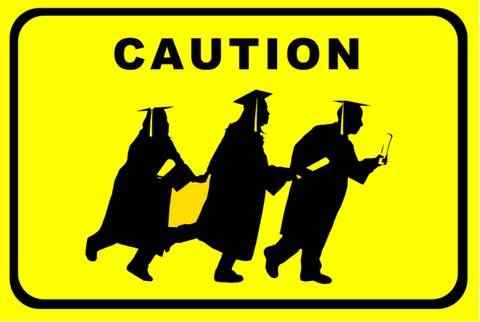CA: Undocumented Students To Access Private Scholarships

California has just created hope for undocumented students. There is possibly more to come but in the meantime there is AB 130. AB 130 is a new law signed by Governor Jerry Brown that allows undocumented students to qualify for private scholarships administered by University of California, Cal State University and the California Community Colleges. This law helps many students achieve their dreams of going to college so that they can become productive members of society and contribute to the place they now see as home. Another law is being held up in legislature that could open up public grants to undocumented students as well. But in the meantime, at least these students can keep dreaming and aiming for brighter futures.
Noel \ /
###
Via LA Times
(LA Times) A day after Gov. Jerry Brown signed a law giving thousands of illegal immigrant college students access to private scholarship funds, immigrant advocates said they are aiming for a far bigger prize: California public grants.
“It was a good step forward, but the glass is still half-empty,” said Ivan Ceja, 19, a Fullerton community college student who was illegally brought to the U.S. from Mexico as a baby.
At a Los Angeles town hall gathering Monday, Brown signed into law AB 130, which will allow undocumented students who qualify for reduced in-state tuition to apply for $88 million in private scholarship funds administered by the University of California, Cal State University and the California Community Colleges. A more significant companion bill, AB 131, would grant access to public scholarships and grants but is bottled up in the Legislature. Both are part of the California Dream Acteffort.
College officials say they do not know exactly how many illegal immigrants pay the lower in-state tuition or will qualify for the private scholarship funds. UC estimates that about 80 undocumented students could qualify for the aid. Overall, about 41,000 students who are illegal immigrants or out-of-state students qualify for the reduced tuition benefit, less than 1% of enrollment in the three systems. To be eligible, students must be California high school graduates and meet other criteria.
Immigrant advocates hailed the new law as a historic step.
“While many states have chosen to legislate hate and division by approving anti-immigrant laws, California’s governor sends a strong message that investing in today’s student population, regardless of their immigration status, is smart, practical and the right thing to do,” said Angelica Salas of the Coalition for Humane Immigrant Rights of Los Angeles.
But critics said the law would hurt California students who are U.S. citizens at a time of rising tuition and continued economic distress.
The new law “is not a good thing,” said Michael Brady, a Redwood City attorney who unsuccessfully challenged California’s 10-year-old policy of giving in-state tuition to illegal immigrants. “It’s too costly, and for every illegal immigrant who takes a scholarship, this hurts a citizen.”
In 2009-10, UC awarded 14,000 scholarships averaging about $3,500 — though the amount varied considerably —- from a $46-million fund supported by private gifts and endowments. Cal State gave $2,200 on average to 11,689 students from its $25.7-million private scholarship fund last year, while the community colleges gave an average of $1,000 to 18,634 students from its $16.9-million fund.
Undocumented students are aiming for larger public scholarships and grants — such as the Cal Grant, which awards up to $12,192. But those are currently available only to U.S. citizens, a requirement that AB 131 would change. Supporters of that bill, also by Assemblyman Gil Cedillo (D-Los Angeles), say they plan to lobby to move it forward next month.
Without financial aid, students said, finishing their studies is a struggle. Ceja said that last year he had to drop out of Fullerton College, where he was studying biomedical engineering, to help support his family after they lost their rental housing.
“The biggest obstacle to finishing our education is figuring out how to pay for it,” said Nancy Meza, an undocumented student from Mexico who graduated from UCLA last year. “Allowing undocumented students access to financial aid won’t just benefit us, it will also help California since we’re the workforce of the future.”












Showing 2 reactions
Sign in with